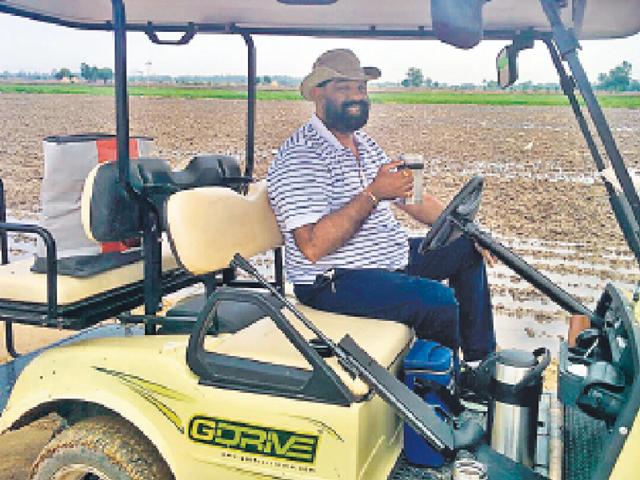
A Sikh driving an electric golf cart around golden fields of harvested wheat and standing crop of maize in a Haryana village. It is not the only contrast.
In the Jat-dominated district of Fatehabad which recently saw violence over their demand for quota in government jobs, 62-year-old Amarjit Singh Dullet—who retired as Punjab chief engineer (canals) last year in April—stands out in the fields of Chuharpur village showing how farming can light up homes, literally!
In the division of ancestral land between four brothers, that of Amarjit fell in Fatehabad district of Haryana bordering Punjab. And between selling it, leasing it out on contract and tilling it, Dullet chose the latter.
Back from morning round of his 60-acre farm, he supervises fruits, vegetables and milk being neatly packed and loaded into a delivery van to nearby markets in Tohana and Jakhar.
While in government service, he had leased out his land for traditional wheat-paddy cycle. But post-retirement, he diverted 14 acres to get three crops a year—rotating the land between potatoes, basmati and corn or pulses such as ‘moong’, ‘masoor’ and from this year, also ‘rajma.’
Advertisement: Replay Ad
The village that had not known basmati, is now following his three-crop cycle. He has now added more fruits and vegetables such as green peas, bell-peppers, onions, apricots, tangerines seedless cucumber, garlic, ‘chickoos’ and guavas in small chunks of land. With cows, goats and roosters for company, he now leads his village by example in self-sufficient and self-sustainable farming. The organic manure comes from cow-dung and fodder from wheat husk and maize, which is also used as silage for dairy.
And he is ploughing back his savings into investing on farm machinery. From reaper, automatic deep plough, automatic green fodder cutter, tractor-driven sprayer, automatic fertiliser spreader to paddy planter, his farm has it all. His latest addition is a 20-KV solar power plant that helps him tide over erratic power supply in the village. Now another farmer in Chuharpur has installed a solar power plant and also those in adjoining villages.
Dullet is not just lighting homes literally but also through employing villagers and promoting the cause of educating girls.
And it is not just his crops that are growing Dullet intends to keep adding the acres. Dullet has taken another 30 acres of his uncle in the village on contract. “Even on small landholdings, allied activities such as dairy and goatery can make farming a lucrative proposition. But small farmers cannot invest in machinery or hold stocks when prices crash like big farmers. Which is where the government needs to be the helping hand,” he says.
A lone ranger, he is not sure his children would take to farming. “This land was bought in 1910 by my grandfather and being near Ghaggar river, it is very fertile. It is also served irrigation water by Bhakra main branch. I had the choice to live at Chandigarh after retirement where my children are settled or 160 kilometres away in my native village amid my farms. But if we don’t take up farming, we can’t hope our next generation would,” he adds.

Leave a Reply